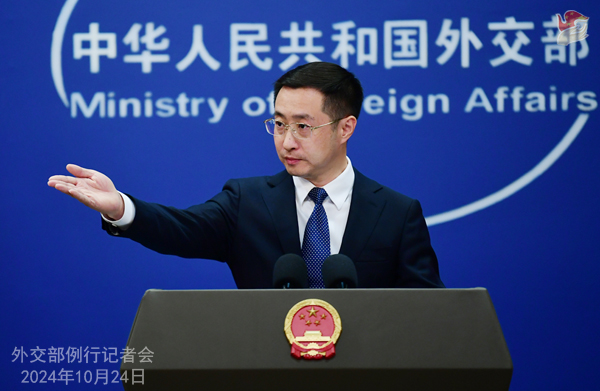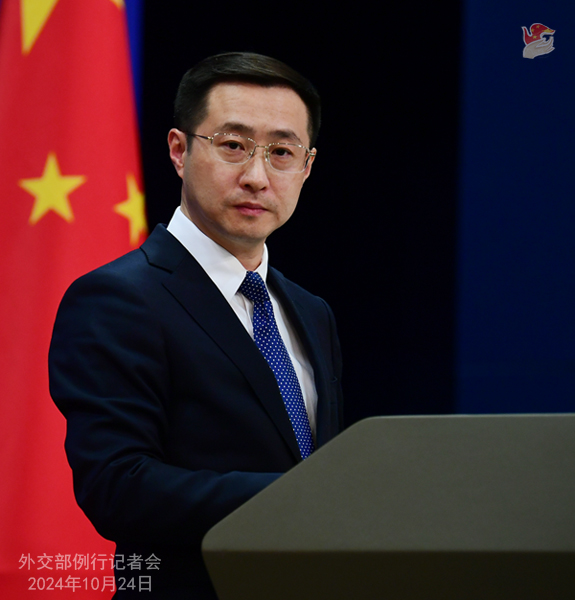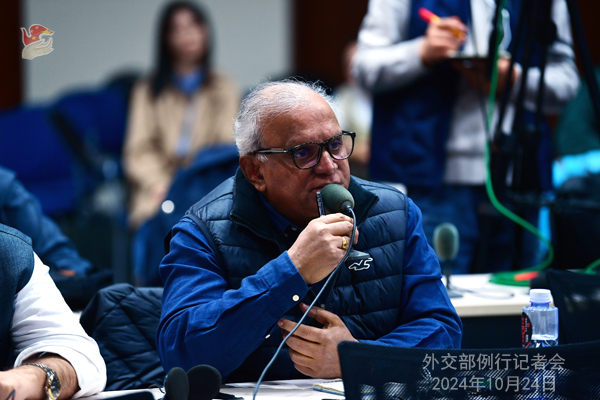
People’s Republic of China


CCTV: Yesterday, President Xi Jinping attended the 16th BRICS Summit and delivered an important statement. It’s commented by many in other countries that President Xi Jinping’s five proposals will elevate BRICS cooperation to a new level and bring new development opportunities to BRCIS countries and the Global South. Could you share with us more details?
Lin Jian: On October 23 local time, the 16th BRICS Summit was held in Kazan. This is the first summit after the enlargement of BRICS and is closely followed by the international community.
President Xi Jinping attended the summit and delivered an important statement. He welcomed new members to the BRICS family, and said that the enlargement of BRICS is a major milestone in its history and a landmark event in the evolution of the international situation. The more unstable the world is, the greater the need for holding high the banner for peace, development, cooperation and mutual benefit, calling for peace, pursuing common development, and consolidating the foundation for cooperation. For the development of BRICS in the future, President Xi Jinping proposed building a BRICS committed to peace and acting as defenders of common security, building a BRICS committed to innovation and acting as pioneers of high-quality development, building a BRICS committed to green development and acting as promoters of sustainable development, building a BRICS committed to justice and acting as forerunners in reforming global governance, and building a BRICS committed to closer people-to-people exchanges and acting as advocates for harmonious coexistence among all civilizations. China has, in collaboration with other countries from the Global South, initiated a group of Friends for Peace to address the Ukraine crisis, and called on all parties in the Middle East to promote an immediate ceasefire and an end to the killing. China announced the establishment of a BRICS Deep-Sea Resources International Research Center and a BRICS Digital Ecosystem Cooperation Network, and committed itself to expanding cooperation with BRICS countries in green industries, clean energy and green mining. China has called on advancing the process of expanding BRICS membership and establishing a partner country mechanism, and promised to implement a capacity-building program for BRICS digital education and open 10 learning centers in BRICS countries in the next five years. These new initiatives and measures respond to what the world needs, reflect what BRICS countries want, and demonstrate China’s firm commitment to and confidence in advancing BRICS cooperation.
Since its founding 18 years ago, the BRICS cooperation mechanism has become an important player in the world. China is an advocate of BRICS development, and more importantly, a contributor to deepening and solidifying BRICS cooperation. President Xi Jinping has chaired or attended the BRICS summits for 12 years running, promoted the establishment of the New Development Bank, and put forward the “BRICS Plus” cooperation format and a good number of important proposals and initiatives, giving a strong boost to BRICS cooperation. Through this summit, China stands ready to work with other BRICS countries to open a new horizon in the high-quality development of greater BRICS cooperation, and make BRICS’ contributions to building a community with a shared future for mankind.
Yonhap News Agency: The ROK intelligence service recently said that the DPRK is transferring troops to Russia. The US and NATO yesterday said there is evidence that the DPRK has sent troops to Russia. According to the UK, it is highly likely that the transfer of troops from the DPRK to Russia has begun. On October 22, a senior official from the ROK presidential office said that the ROK may consider providing defensive weapons and potentially progressing to offensive weapons later if the DPRK goes too far. I have two questions on that. First, does China believe that the DPRK sent troops to Russia? Second, the DPRK’s troop dispatch has pushed the protracted Ukraine crisis into a new stage. What’s China’s view on that?
Lin Jian: On your first question, China does not have information on that.
On your second question, China’s position on the Ukraine crisis is consistent and clear. We hope all parties will promote the deescalation of the situation and strive for a political settlement.
Global Times: Today marks the 79th anniversary of the establishment of the United Nations (UN). We are now facing prolonged hotspot issues, such as the Gaza conflict, and complicated differences among countries. Some believe that the authority of the UN is being undermined, multilateralism faces headwind and the future of the world is full of uncertainty. What’s your comment and how does China view the role of the UN?
Lin Jian: We congratulate the UN on the 79th anniversary of its founding. As the most universal, representative and authoritative international inter-governmental organization, the UN has played an irreplaceable role in upholding world peace and development.
As the first country to put its signature on the UN Charter, China has all along upheld the purposes and principles of the UN Charter, supported the UN in playing a central role in international affairs, proposed the Global Development Initiative, the Global Security Initiative and the Global Civilization Initiative, promoted the building of a community with a shared future for mankind, and led the Global South in advancing solidarity and cooperation. China is an upholder of world peace, contributor to global development and defender of the international order.
The more complex the international landscape, the greater the need to firmly defend the authority of the UN; the more acute the global challenges, the greater the need for true multilateralism. China always supports reform and development of the UN and increasing the representation and say of developing countries. Major countries, in particular, need to undertake their responsibilities, promote the UN including the Security Council to better fulfill their mandate, more effectively build up global consensus and better uphold world peace, stability and development. Unilateralism, bullying and coercion, and sanction and pressuring contravene the international community’s common pursuit for stability and development and opposition to division and conflict, and will only undermine the common interests of all countries.
Not long ago, the UN held the Summit of the Future where participating parties adopted the UN Pact for the Future. Next year will mark the 80th anniversary of the establishment of the UN. As a permanent member of the UN Security Council and a responsible major country, China will continue to uphold the principle of extensive consultation, joint contribution and shared benefit, work with the rest of the world to practice true multilateralism, defend the UN-centered international system and the international order based on international law, and make the global governance system more just and equitable.

Anadolu Agency: Terrorists attacked headquarters of Turkish Aerospace Industries in the nation’s capital yesterday. Armed assailants killed 5 civilians and injured 22 others. What is China’s comment?
Lin Jian: China firmly opposes all forms of terrorism. We express our condolences over the lives lost in the incident, and our sympathies to those injured. As a friend, China hopes to see security and stability upheld in Türkiye.
Rudaw Media Network: There is ongoing discussion about disarming Kurdish guerrillas and addressing the Kurdish question in Türkiye. And the Turkish President has supported or has shown his support for this initiative, mentioning or calling it a “window of hope.” Will China monitor the talks?
Lin Jian: I do not have information on what you mentioned.
PTI: We had a very eventful meeting yesterday between Prime Minister Narendra Modi and President Xi Jinping on the sidelines of the BRICS. Of course there is an elaborate press release on what President Xi said issued by the MFA, but I would like to know how China views the outcome of the meeting between the two leaders considering what we went through over four and a half years of freezing of relations between the two countries.
Lin Jian: On October 23, President Xi Jinping met with Indian Prime Minister Narendra Modi on the margins of the BRICS Summit held in Kazan, Russia. They reached important common understandings on improving and developing China-India relations and set the course to steer bilateral relations back on the path of steady development. China stands ready to work with India to view and handle the bilateral relations from a strategic height and long-term perspective, step up communication and cooperation, enhance strategic mutual trust, properly handle differences, bring bilateral relations back to the path of steady development as soon as possible, and contribute to maintaining regional and global peace and prosperity and to advancing multipolarity in the world.
AFP: Indonesia’s Maritime Security Agency said today that they have driven Chinese coast guard vessels from its waters in the North Natuna Sea two times in recent days. Can the Ministry confirm that these incidents took place and what is the Ministry’s comment?
Lin Jian: China Coast Guard vessel carries out routine patrols in waters under the jurisdiction of China in accordance with international law and China’s domestic laws. China stands ready to enhance communication and consultation with Indonesia through diplomatic channels and properly handle maritime issues between the two countries.
PTI: The Xinhua report that mentioned the talks also spoke about President Xi agreeing in principle to Mr. Modi’s suggestions to improve relations. Can you share the details regarding what suggestions he has accepted?
Lin Jian: President Xi Jinping and Indian Prime Minister Narendra Modi reached important common understandings on improving and developing China-India relations. Both sides were of the view that this meeting is constructive and carries great significance. They agreed to view and handle China-India relations from a strategic height and long-term perspective, prevent specific disagreements from affecting the overall relationship, and contribute to maintaining regional and global peace and prosperity and to advancing multipolarity in the world.
The two sides agreed to strengthen communication and cooperation, enhance strategic mutual trust, hold talks between their foreign ministers and officials at various levels to bring the relationship back to steady development at an early date, make good use of the Special Representatives mechanism on the China-India boundary question, ensure peace and tranquility in the border areas, find a fair and reasonable settlement, step up communication and cooperation in multilateral fora, and safeguard the common interests of developing countries.




